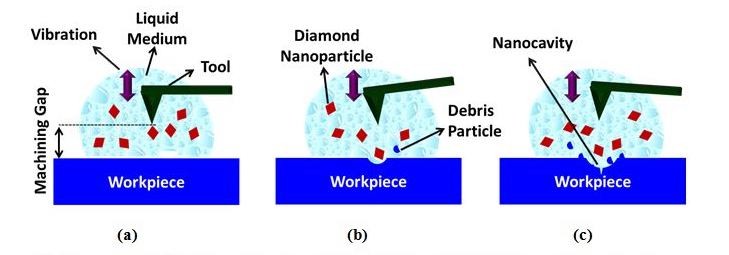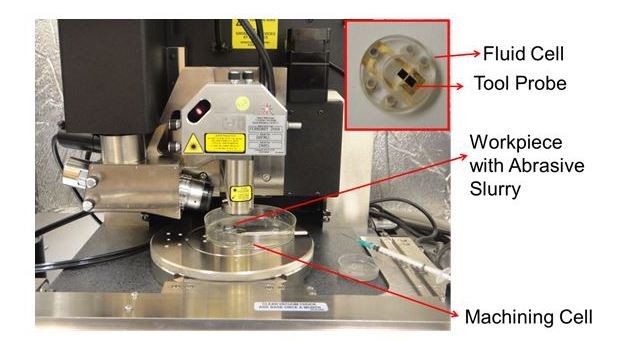Vibration Assisted Nano Impact machining by Loose Abrasives (VANILA)
Nanomachining of hard and brittle materials such as glass and ceramics is a challenge. Mechanical based techniques such as nanoindentation or nano scratching are feasible but direct contact of tool with the workpiece in such processes causes large scale tool wear. In this research, the target specific machining capability of single point tool based processes is combined with the hard and brittle material machining abilities of abrasives, to achieve Vibration Assisted Nano Impact-machining by Loose Abrasives (VANILA process) - a novel hybrid nanomachining process that uses a single-point AFM probe with loose abrasives and vibration assistance to perform target specific impact-based machining of nanoscale features on hard and brittle materials.
Process Principle and Nanomachining Results
VANILA process is a tip-based nanomachining process that uses a single-point AFM probe with loose abrasives and vibration assistance (Figure 1) and can be used to perform target specific impact-based machining of brittle materials at nanoscale. The VANILA process is conducted on an atomic force microscope (AFM) shown in Figure 2 as the platform and a slurry of nano diamond powders smaller than 10 nm which is introduced between the tool and the workpiece. The tool used is a tapping mode AFM tip and it is vibrated constantly while maintaining a constant distance from the workpiece as shown in figure 1a. This results in continuous hammering of suspended nano diamond powders which in turn impact the impact the workpiece surface repeatedly resulting in nanoscale material removal (figures 1b and 1c). Some of the nanoscale features machined by VANILA process are shown in Figures 3-5.

Figure 1 Schematic Diagram of the VANILA process a) Vibrating tool hammers the diamond nano-particles b) Nano-particle impact the workpiece surface causing material removal c) Repeated impacts of diamond nanoparticles resulting in Nanocavity formation on workpiece surface

Figure 2 Experimental Setup

Figure 3 AFM images of nano-cavity (2) machined through VANILA Process (machining time 20 seconds)

Figure 4 Topography of nanocavities (Pattern 1)

Figure 5 Topography of nanocavities (Pattern 2)
The tool used in VANILA process is an AFM probe which has a nanoscale tip radius. The tool wear is found to be affected by the impact velocity of the abrasives and the effective tool tip as shown in Figure 6.

Figure 6

Figure 7 Study of Tool wear